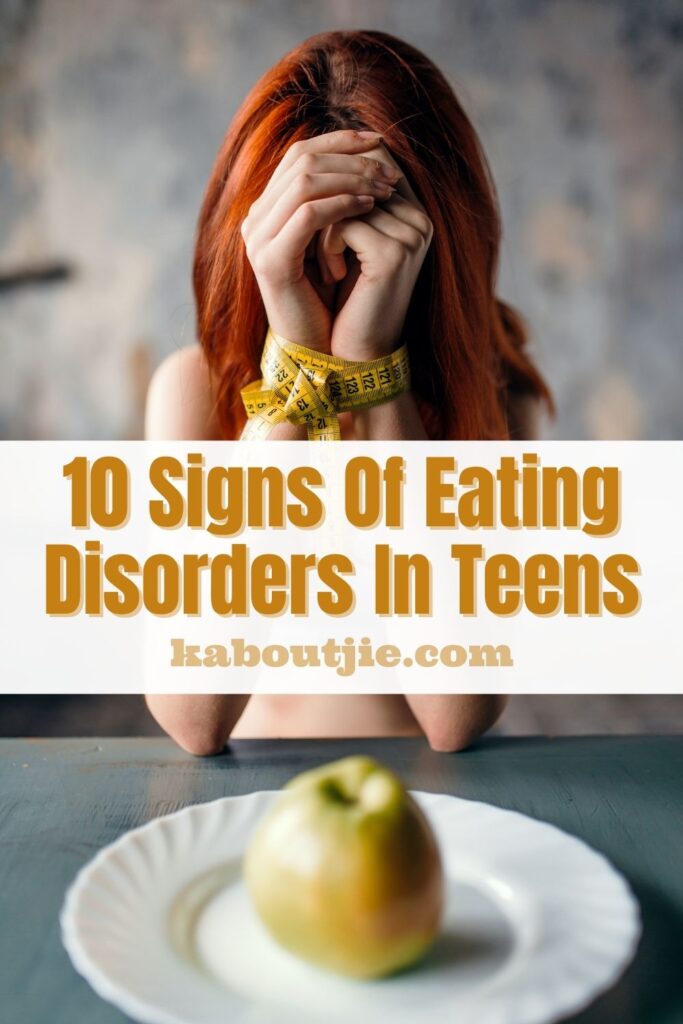Eating disorders are complex mental health disorders. If an eating disorder is left untreated it can lead to serious complications, that could end up in fatality. Complications can include heart attacks, tachycardia and heart arrhythmia. Anorexia nervosa has the highest fatality rate of any mental health disorder.
The most common age for the onset of an eating disorder is between 15 and 25 years old. Eating disorders are more common in females, however 10% of cases diagnosed are males. Early diagnosis and treatment will offer the best outcome for your child, make sure to contact a teen eating disorder treatment centre if you are concerned about your child having an eating disorder.

Signs Of Eating Disorders In Teens To Look Out For
Insecurity About Body
While many teens go through a very normal stage of feeling insecure, if you teen is showing persistent worry about body shape, size or weight it can be a concern. If your teen is constantly complaining about being fat and wanting to lose weight it can be a red flag. It must be noted that not all eating disorders come with body insecurity, and some body insecurity can be a normal teenage phase.
Avoiding Eating In Front Of Others
If you teen has an eating disorder she may avoid eating in public or in front of other people, making excuses not to eat with family or friends. Those with eating disorders sometimes take great pleasure in preparing meals for others then rarely join in to eat.
Restricting Certain Foods Excessively
Those with eating disorders may restrict certain food groups or foods, be preoccupied with dieting, calories, or fat grams. Eating or not eating is about control.
If your child has restrictive food intake disorder shed may also stop eating certain foods due to fear of purging or choking.
Your teen may also show signs of eating rituals such as cutting food up into small pieces, or arranging food so that it appears she is eating when in fact no food, or very little, has been eaten.
Changes In Appearance
Keep an eye on weight fluctuations, or significant weight gain or loss, as well as dry skin or hair, hair loss, or excessive body or facial hair. Puffy cheeks can be due to swollen salivary glands.
Physiological Change
Certain changes are common with eating disorders. Changes in sleep pattern, feeling faint or tired, feeling sensitive to cold, or menstrual cycles becoming irregular or stopping can be of concern.
Overeating
If your teen binge eats and appears out of control while eating it can be a concern, particularly if your teen follows a pattern of eating when not hungry and eating past the point of comfort.
Eating In Secrecy
It is a concern if your teen is eating large amounts of food in secret. You may notice food is missing or find empty wrappers or containers in the house.
Exercising Excessively
Your teen may be obsessive about exercising, even when sick, tired or injured.
Purging
This involves vomiting or using diuretics, laxatives, or other substances. Your teen will leave the table after a meal to purge.
Isolating
Withdrawing from friends and family, and not participating in activities and hobbies that was previously enjoyed can be a sign that something is wrong.

Three Common Types Of Eating Disorders
Anorexia nervosa is characterized by weight loss, difficulty in maintaining weight for height, stature, and age, and for many, a distorted body image. People with anorexia nervosa usually restrict the types of food and the number of calories they consume. Some also binge eat, purge, and/ or exercise excessively.
Bulimia nervosa is characterized by recurring and frequent episodes of binge eating, followed by purging. Those suffering with bulimia nervosa may be overweight, normal weight or slightly underweight.
Binge eating disorder (BED) is a serious and life-threatening eating disorder that is characterized by recurring episodes of consuming large quantities of food, often quickly and past the point of comfort. There is a feeling of loss of control during the binge eating, followed by feeling guilt, shame, and/or distress afterwards. Those with binge eating disorder do not purge after binge eating.
Binge eating disorder is the most common type of eating disorder, affecting 2% of people worldwide.two main
It is important to emphasize how dangerous eating disorders can be, if your child is showing signs of an eating disorder make sure to contact a treatment centre specializing in eating disorders to get the help you need for your teen as soon as possible. Eating disorders are treatable at many addiction centres.
 Kaboutjie SA Mommy Blogs by Lynne Huysamen
Kaboutjie SA Mommy Blogs by Lynne Huysamen





I have an old brother who I think has the binge eating disorder, if you become an adult, can you control it? Or does it have a certain control on you?
Eating disorders can be managed, it is very much like addiction. It is important to learn the right tools and coping mechanisms, and of course there are underlying issues that need to be addressed. If he is looking for help I highly recommend contacting an addiction treatment centre that deals with eating disorders. Another great resource is EDA (Eating Disorders Anonymous) – it works on a 12 step program very much like AA (Alcoholics Anonymous) and NA (Narcotics Anonymous).
🤗 Love this, this is beyond helpful and I myself need to stop eating so much as I find myself doing it more than is necessary 😔
We received help for my son who was binge eating and stealing food. It’s really great to see the changes in him now. We discovered that being bullied was what caused him to do it,but he did not disclose it to us